Peter Cawdron's Blog
October 17, 2025
Retrieving samples from Exoplanets
The first confirmed interstellar object to pass through our solar system was 1I\ʻOumuamua, and from the outset, it was clear this was not a comet or even an asteroid, but rather some kind of fragment (possibly from a planet or moon).
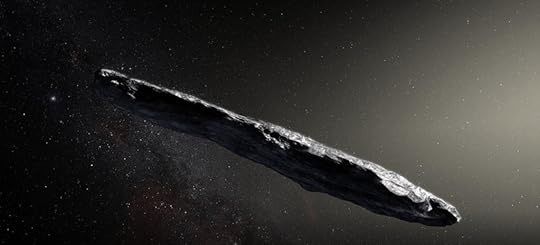
As more information came to light, though, the artist’s renditions became less sci-fi and more scientifically plausible, with the latest explanation being that ‘Oumuamua was probably blown off the surface of a minor planet roughly the size of Pluto.
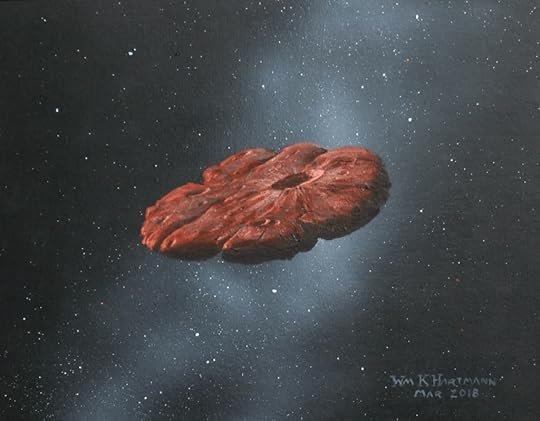
Based on the degree of erosion due to cosmic rays, scientists were even able to estimate ‘Oumuamua’s approximate age, and calculate that it took roughly 400 million years to reach our solar system. Given that it is moving at 26 km/s (16 miles per second) and has been traveling for hundreds of millions of years, it could have originated from anywhere within about 30,000 light-years from Earth, or roughly a third of the galaxy!

A slight discrepancy between its motion and the influence of gravity led scientists to realize there was some form of outgassing, making it at least comet-like, and propelling it along, but this didn’t stop Harvard astrophysicists and alien hunter Avi Loeb from claiming it was an alien spacecraft (sigh).
As the difference was 17 m/s or about 40 mph, it’s hardly a warp drive. The only conclusion that I can reach is that if ‘Oumuamua is an alien spacecraft, its engines are worse than ours!

And that brings us to 3I\Atlas, the latest interloper passing through our solar system. Like 1I\ʻOumuamua, there’s intense speculation from Avi Loeb about it being an alien spacecraft (sighs again). Loeb even invented the Loeb scale for deviations from naturally occurring objects (conveniently and unabashedly named after himself) and rates it a 4 out of 10. If it were a movie on IMDB, it would rate alongside Madame Web and Inspector Gadget.
There are some great articles about 3I\Atlas that are worth reading, but there’s also a lot of trash.
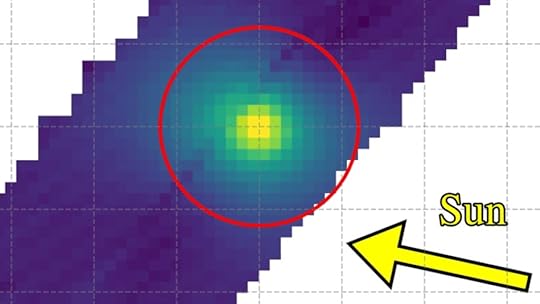
The most curious thing about 3I\Atlas is that it is outgassing nickel and cyanide, which is not what we would associate with an icy comet or an asteroid, suggesting that, like 1I\ʻOumuamua, its origins are more complex than usual.
At the moment, the current working hypothesis is that 3I\Atlas could have originated in a sedimentary basin on an exoplanet that might have once hosted life! 3I\Atlas could have been blasted off its home world by an impact similar to the one that wiped out the majority of the dinosaurs!

The Chicxulub impact that killed the dinosaurs definitely launched material into space. Rocks several meters wide would have made it to the Moon and Mars. And this brings up an interesting point: only a tiny fraction of the material thrown up in impacts like this escape into space, and these fragments tend to be small, so objects the size of 1I\ʻOumuamua and 3I\Atlas would have come from significantly BIGGER impacts! Also, it means that although we’re catching things the size of ʻOumuamua and Atlas, we’re probably missing the more numerous small fragments!
Whether fragments from Chicxulub could have escaped the solar system is difficult to determine, but they could have received natural gravity assists and soared off toward other star systems. If so, while we’re watching 3I\Atlas soar through our solar system, after 65 million years, aliens up to 9,000 light-years away could be tracking rocks that hold dinosaur fossils as they tumble through the dark void of space!
But… Hold the phone…
We will undoubtedly learn more about ʻOumuamua and Atlas so we need to be careful about drawing conclusions too soon. For now, it’s an exciting possibility, but the real takeaway here is that we’ve had three confirmed interstellar objects pass through our solar system in eight years, and at least two of them appear to be fragments of a significant astronomical body in another star system (ie, not a regular asteroid or a comet). That is fantastic!
This means—if we get our act together and develop a robotic interceptor spacecraft, have it sitting in orbit ready to go—we could collect samples from worlds around OTHER stars before we get samples from Mars! Think about how astonishing that would be… in all likelihood, we won’t be able to achieve interstellar flight for centuries if not millennia to come, but we don’t have to. Exoplanet samples are being delivered to our door by cosmic USPS.
This isn’t science fiction. We know how to do this. We’ve already done this several times before. We’ve been doing this since NASA’s Stardust mission in 2006. We’ve done this four times, and a fifth mission by the Chinese is already underway.
The real point to take from 1I\ʻOumuamua and 3I\Atlas is that we can sample exoplanets without leaving our own solar system! I’m sure someone at NASA, JAXA, ESA, CNSA, etc is already drawing up plans to catch the next 3I\Atlas.
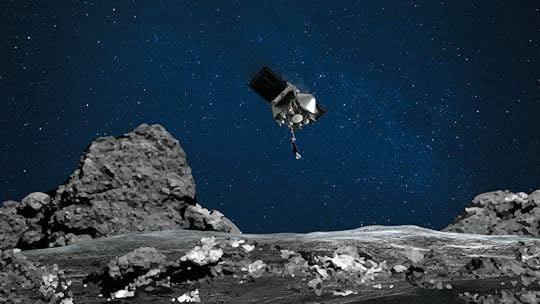
In the meantime, if you’re interested in speculative (hard) science fiction about interstellar comets, check out my novel Gold Rush, and if you’re curious about what we might find on the shattered remnants of an exoplanet, check out The Darkness Between the Stars. Who knows, maybe one day this kind of science fiction will become science fact!

October 15, 2025
2001: A Space Oddity
Is it true? Can you separate the art from the artist?
I don’t think so. As much as I loved Michael Jackson’s music in the 80s, and in particular Black or White and Billie Jean, I don’t listen to those songs anymore.
Art is an expression of the artist. It is shaped and molded and amplified by the artist, but more than that, art is a signature. Were it anonymous, that would be different, and art could stand alone, but it’s not. The artist’s prestige is part of the art itself.
And this leads me to Arthur C. Clarke, one of the legends of science fiction. I only just learned about the allegations of pedophilia raised against him. Clarke, himself, denied them and was cleared by the Sri Lankan police, but that doesn’t mean he’s innocent, only that he wasn’t prosecuted.
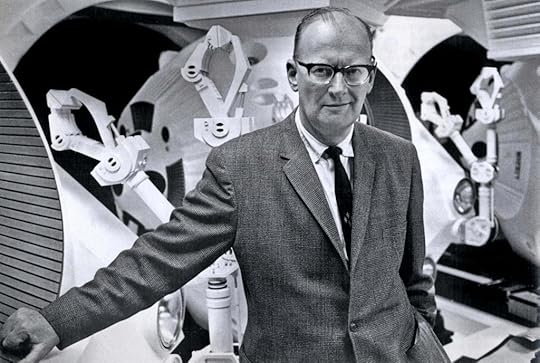
Dayanada de Silva, director of current affairs at the Sri Lanka Broadcasting Authority, said: “Arthur likes casual affairs with lots of different boys. If I think he might like one of my boys, I give them his phone number; he asked me to. The last time I saw Arthur, a few months ago, he was still having casual sex with boys. The boys do it for money, and money is nothing to Arthur C Clarke…” And at another point, saying, “He gets a lot of pleasure by moving with the teenage lifesavers. They are between 15 and 17. I have even sent Arthur boys, he shares the same tastes as me.“
In an interview with the Sunday Mirror (the audio for which has been conveniently lost), Clarke allegedly said of one encounter that, “If he really was 13, he will be a very mature 13… [and that such boys] looked reasonably mature. Mature enough for me.”
The age of consent in Sri Lanka is 16, which (conveniently) muddies accusations of sex with boys from the ages of 13 to 18, especially when no one is asking for ID.
It’s important to note that the Sunday Mirror subsequently published an apology and retracted their previous article. Clarke chose not to sue for defamation.
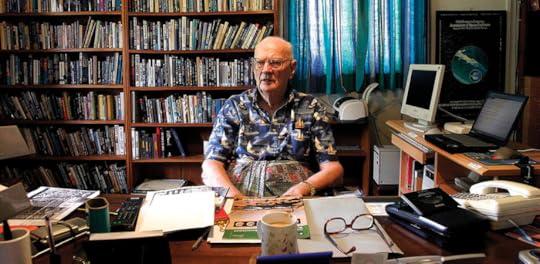
When asked if he was gay, Clarke replied, “No, just mildly cheerful… It would embarrass the family, you see… I could become the target of bigots.” And this was the essence of his defense, that there was a “long-standing conspiracy… in Sri Lanka to discredit” him.
And so we’re left with a conundrum: whether to believe his defense, which sounds reasonable, or to believe his accusers, like Peter Troyer, who stopped short of naming Clarke but left a detailed account of a shady encounter.
As humans, we love a sense of accomplishment, regardless of whether that is a world record in the Olympics or success in business or a golden Oscar in entertainment. We revel in feats of daring and strength. We honor those who achieve greatness in their field. And here in lies our achilles’ heel—what do we do when our heroes are shown not merely to be flawed, but morally bankrupt, preying on the most vulnerable?
The challenge is not to worship our heroes. Admiring them for their works while ignoring how they lived is wrong. Claiming ignorance or uncertainty to continue admiring them is cowardly.
Does this mean Arthur C. Clarke is cancelled? No, but it does mean I take a sober, objective position on his life and won’t canonize him as a saint or lionize him as a hero. His works are monumental, but they’re also stained. I’m not cancelling him—he did this to himself. He tarnished his own legacy.
October 5, 2025
The Oracle
The Oracle is a First Contact novel set during World War II and the German occupation of Greece.
 Mild spoilers to follow
Mild spoilers to followWhile writing The Oracle, I was struck by the realization that all stories are stories within stories. Pick any novel, or any historical event for that matter, and you’re looking at a story within a larger story. And this is true even of our lives. No one stands alone. We live in the context of our families, our cultures and our times, and we can’t be understood outside of them. This was particularly true of those in the Second World War, where individuals were caught up and swept along in the current of death and destruction in the fight for freedom.
In The Oracle, I look at how First Contact shapes our perception of ourselves, and examine the possibility of contact through the eyes of a naive young German soldier coming to grips with the harsh reality of war. In an unabashed callback to Indiana Jones, the Germans are in search of a primitive wunderweapon, seeking some divine talisman to win the war. And in this novel, that takes the form of the legend of the Oracle of Delphi, treating it as a historical account rather than a myth. In my novel, rather than being supernatural, the Oracle is extraterrestrial in origin.
 The leichter Panzerspähwagen was a light-armored vehicle used in Greece by the Germans.
The leichter Panzerspähwagen was a light-armored vehicle used in Greece by the Germans.This is First Contact, but from the perspective of extraterrestrials rather than humans, with an intelligent alien species grappling to understand the warlike nature of humanity.
Humans are curiosities. On the level of the individual, for the most part, we’re warm and kind and nurture our families, but collectively we’re driven by culture, ideology and religion, which are often used as excuses for selfishness, prejudice and bigotry. And when taken to an extreme, these result in war. Perhaps I’m naive, but I think war is a tool to oppress and exploit others without merit. War is might-makes-right, only it doesn’t.
There are no winners in war, only losers. At the outset of any war, the only real question is who will lose the most? Whoever loses the least amount of land, people, resources and pride, we crown as the winner.
World War II was particularly brutal as it was a clash of naked aggression in the desire for power against the idea that people have the right to self-determination and the freedom to live in peace.
In 1943, Norman Rockwell painted the Four Freedoms to help raise war bonds—and 80 years later, I think they’re still relevant: the freedom of worship, the freedom of speech, the freedom from fear and the freedom from want. It strikes me that all wars revolve around one or more of these concepts, either in defense of them or to take them away from people. These four freedoms/values are really the only way to understand war.

I hope you’ll enjoy The Oracle as much as I have. It’s a fascinating look at a dark period in our history.
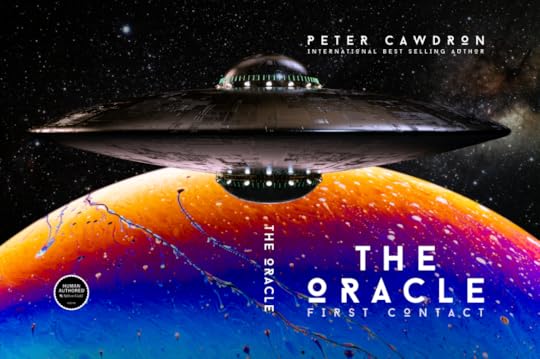
The Oracle is scheduled to launch on October 24, 2025.
July 24, 2025
Gold Rush
Hollywood and Netflix love to dramatize historical waves like the California gold rush and glamorize the hardships, but the reality is that during gold rushes, most wealth was generated not by miners, but by those who supplied and supported them.
Samuel Brannan, a merchant during the California Gold Rush, bought up mining supplies from around the country and resold them in California at massive markups, earning upwards of $5,000 a day (or roughly $120,000 a day in today’s economy). Merchants, boarding houses, saloons, laundries, gambling and entertainment parlors earned far more money—and importantly—more consistent income than miners themselves! The economic boom around gold made more money in California than the gold itself, and led to the phrase, “Sell the shovel, not the gold.”

Gold rushes were important drivers of expansion, far outstripping the actual gold, and set up states like California and even countries like Australia and New Zealand with thriving economies.
What would it take for us to see a gold rush in space?
It’s easy to look at ideas like mining asteroids or the Moon or setting up colonies on Mars as the 21st-century equivalent of a gold rush, but like historical gold rushes, the real value won’t come from anything shiny and glamorous.
In my latest novel, I propose that Venus, rather than Mars, the Moon or any asteroid, is better suited for a gold rush.
But isn’t Venus a seething, boiling, crushing hell? Why, yes, it is… We could no more build a city on Venus than we could build one at the bottom of the Marianas Trench, but here on Earth, we avoid places that would crush us like a bug on a windscreen. Instead, we float above them in cruise ships.

How feasible is this on Venus?
It’s actually realistic. The insane density within the Venusian atmosphere means that a nitrogen/oxygen mix on Venus works roughly as well as hydrogen or helium in blimps here on Earth, and that means instead of being limited to just the basket beneath a blimp, we could live INSIDE them, breathing the air they use to float among the clouds. NASA’s HAVOC project even explored this idea, although there are no plans for this to proceed.
From a practical perspective, the real problem is the insane wind speeds and the sulphuric acid in the clouds, but (as discussed in my latest novel, Gold Rush) these could largely be resolved by crashing a modest-sized comet into the planet! It’s terraforming done easily.
Also, from a practical perspective, it’s important to note that at the altitude these blimps would float at, the temperature would be balmy, around 50-60F or roughly 10-15C and the air pressure is almost the same as here on Earth. If the acid were removed from the atmosphere, you could walk around outside your blimp with little more than SCUBA gear on!
And then there’s the industrial potential… Venus gets almost TWICE as much sunlight as Earth, so energy is super-abundant. Ah, but you can’t mine resources on Venus. No, and for rare metals and things like iron and copper, that is a problem, but ALL the carbon in biology comes from the air. It’s all come from plants turning CO2 into sugars and that propagating throughout the ecosystem to build your body, bones and brain, etc. In terms of percentage of body mass, carbon is second only to oxygen! Carbon is an astonishingly versatile element, and there is no shortage of it on Venus. Oh, and the byproduct of mining carbon out of the atmosphere of Venus is oxygen! It’s win-win.
Mars gets all the airtime from pundits, but physically, it is closer in size to the Moon than it is to Earth, and this means it is problematic. Even if Mars was terraformed, its gravity is so weak it can’t hold onto an atmosphere and without a magnetic field, it gets pummeled by cosmic radiation.
Not one planet in our solar system measures up to Earth, but Venus is far closer than it might at first seem.
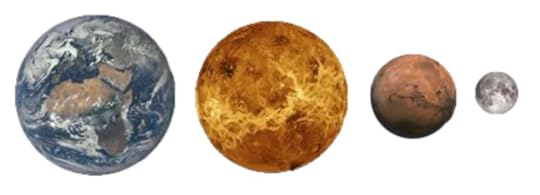
Realistically, we’ll settle Mars before we get to Venus, but it is interesting to consider just how astonishingly viable Venus is as a planet. Far from being hellish, it might be a better long-term option than Mars and second only to Earth.
Crashing comets into planets is a rare event in the universe, but it’s not entirely implausible, with Comet 31/Atlas soaring past Mars later this year!

Somewhat fortuitously, as the book launches, this interstellar comet is racing through our solar system, having come from elsewhere within our galaxy. As this scenario is the set-up for my story, I’d like to think the cosmos is helping out with a marketing stunt. Seriously, though, there are even some astronomers suggesting this is a deliberate fly-by being conducted by an extraterrestrial intelligence, but I still think my cosmic marketing suggestion is far more realistic.
Gold Rush is available now as an ebook, paperback and hardback, with the audiobook coming soon. If you want to explore the possibility of First Contact with an extraterrestrial civilization settling on Venus, grab a copy today!
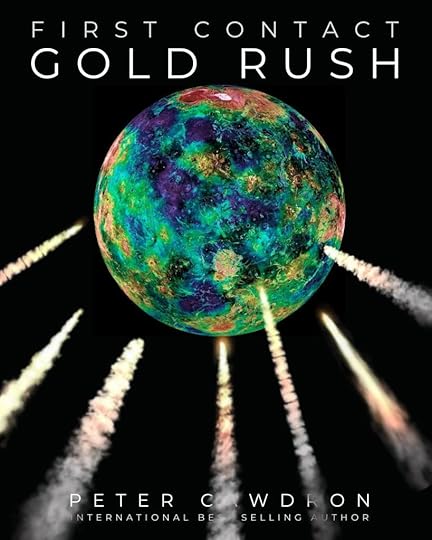
July 21, 2025
What’s for Dinner?
Somewhere around 1760, Jean-Jacques Rousseau said, “When the people shall have nothing more to eat, they will eat the rich.” Ever since then, Eat the Rich has been a rallying cry for inequality.
Modern society is based on what we call the social contract, being an understanding that ALL of us are better off if we ALL follow the rules. And the social contract works beautifully. Preppers and libertarians will tell you that you can do it alone, but that’s a lie. Ever since we first formed tribes, well over a hundred thousand years ago, we’ve learned that there is strength in numbers. If someone wants to go and live in the woods by themselves, wonderful, but if you’re using solar power or gas or a knife made in China or a gun, you are NOT living off the grid. You are very much still dependent on the grid, as that’s where all that stuff is made—you’re only fooling yourself.
So what’s for dinner? What are we going to eat? The reality is, if we all work together with fairness and equity, there is plenty to go around, but at a certain point, the ultra-wealthy violate the social contract by squandering resources like Smaug and his pile of gold.

Violating the social contract, though, is deceptive. It may look like Elon and Jeff have billions, but they’re short-sighted. Ultimately, they’re like the mythical snake Oroborus, which ate its own tail.

That absurd, crazy dollar value that indicates their wealth is calculated by multiplying the stock price by the sheer number of shares they hold—and it continues to grow over time, but at what cost? It’s easy for billionaires to think they really are sitting on a pile of gold, but they’re actually eating their own tails. They’re undermining the very system that has allowed them to succeed. Nowhere is this more obvious than when it comes to climate change.
The fossil fuel industry has made TRILLIONS since the 1970s when it first realized human emissions were causing the atmosphere to warm. If you earned ten thousand dollars a day, it would take you 275,000 years to earn a trillion dollars—that’s roughly the amount of time Homo sapiens has existed as a distinct species! It’s an absurd amount of money, and the fossil fuel industry has done it in just a few decades!
Wait, did I say they made a trillion dollars since 1970? I meant to say they’ve made a trillion dollars a year in pure, unadulterated PROFIT since 1970. That’s more than 50 trillion dollars! If you earned ten thousand dollars a day, it would take you almost 14 million years to earn 50 trillion dollars. For context, 14 million years ago, to put this in context, back then, our ancestors were diverging into the Great Apes! And they’ve accomplished this in just a few decades!

All this is to say, the excesses of the fossil fuel industry and its Smaug-like greed are clearly NOT sustainable and a breach of the social contract. Destroying the planet and the environment for insane corporate profits will go down as well as Oroborus eating its own tail. No one will be spared. Already, we’re seeing insane changes in the climate, from the increase in frequency of cyclones and hurricanes, to the warming of the ocean, to rampant flooding. We—as a society—are eating our own tail. Well, the fossil fuel industry is because governments want eternal economic growth.
To say we’re shortsighted is an understatement.

We’ve been sold a lie.
I know… I know… capitalism is the best. It’s lifted more people out of poverty than any other economic system, but unrestrained capitalism is madness. It’s like handing the keys of a Ferrari to your 16-year-old son and saying, “This is the best car on the road.” It sure is… until it’s the best car wrapped around a telephone pole.
We can’t afford to stick our heads in the sand. We need to demand change from our politicians. We need to hold the fossil fuel industry to account. We need to stop giving the dragon Smaug a free pass and start demanding that those profits go into fixing the problem they’ve created.
We don’t need to eat the rich. We need the rich to accept that we are all in this together. We need to return to a system that values equality.
If you want to make America great again, then how about instituting the tax rate in the 1950s, when America became an economic powerhouse. A 90% tax rate may sound absurd, but in practice, the wealthiest 1% of Americans ended up paying roughly 40% income tax. But taxing the super wealthy and taxing corporations like the fossil fuel industry is the only way we’re going to stop them from eating their own tails. If it costs them to pollute, they’ll do something about reducing emissions.
June 21, 2025
The Age of Misinformation
When the internet came of age in the early 2000s, the hope was that a single source of information would unify humanity. Since then, it’s become more like Pandora’s Box, where what should have been a gift has been corrupted and weaponized against us.
Humanity’s crowning achievement is knowledge.
Knowledge allowed us to depart from the animal kingdom. It was the knowledge of how to build stone axes and how to make fire that set us apart as a species. Over time, that transformed into the knowledge of how to cultivate crops and farm animals for slaughter. With these two inventions, the necessity of the hunter-gatherer came to an end. The invention of writing appears to be related to commerce, allowing trade to be undertaken, ledgers to be kept, debts to be collected, and taxes to be raised. Armies arose as a means of stealing wealth and resources and conquering rivals.
Woven throughout history is the importance and ascendancy of knowledge. The counterpoint to knowledge is lies. As knowledge has grown, so have lies, as BOTH provide a means of influencing others and getting people to band together. From at least the time of the pharaohs, the divine right of kings has been a lie used to subjugate people. And then arose the Age of Reason, where philosophers dared to challenge the norms of politics and religion, marking the birth of modern democracy.
The Age of Reason is a spectacular triumph of human intellect. For Kant, Voltaire and Rousseau, it seemed as though a new world was awakening. After several world wars and untold conflicts, humans have failed to advance to live in reason, to build a society based on logic and evidence. Instead, we have fallen into the Age of Misinformation, where lies are peddled as truth.
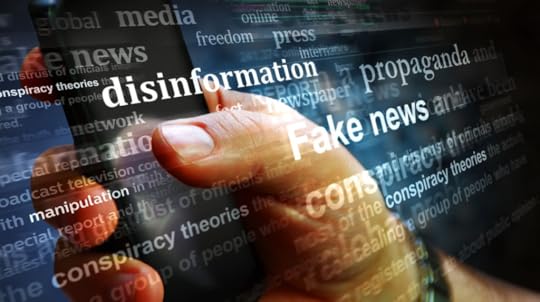
It is both tragic and fascinating to see how quickly people seize on lies they agree with instead of having the honesty to hold to the truth. Nowhere has this been more evident than in the irrational response to the pandemic, where vaccines have been criticized as though there were no lethal virus sweeping the world. The problem is… human instinct is to rush to judgment.
“To prejudge other men’s notions before we have looked into them is … to put out our own eyes.” John Locke (1632–1704)
And this raises an interesting question… why are we so susceptible to lies? Why are we so susceptible to grifters manipulating us for their own greedy gains? Why do we distrust good science in favor or self-grandizing liars? Perhaps the most odious example of this is the supposed “wellness” industry that has set itself up as the champion of the people, protecting us from the evils of Big Pharma. Challenging evidence-based medicine is a 7 trillion dollar a year industry—and for what? Because “Big Pharma” is the problem with our health. And yet that industry comes in at less than 2 trillion dollars a year! Lies, it seems, are highly profitable, but not helpful.
Why do intelligent people fall for lies? Why haven’t we moved on from the Age of Reason and Enlightenment to something greater? Why have we gone backwards so easily under the onslaught of misinformation?
The answer is right there in our history if we care to look for it.
Humans are intelligent. Of that, there is no doubt. But consider how small the Age of Reason is compared to the Age of Superstition and Religion that preceded it. Even if we take a modest estimate and start counting from the advent of cultivation, allowing civilizations to arise, it’s a few hundred years set against ten thousand years. Why did it take so long for the Age of Reason to occur? The answer is chilling…
We like to think for ourselves. We like to reason things through. We pride ourselves on our opinions. But the act of reasoning isn’t what we think… Our ability to reason didn’t arise because we needed to solve problems; it arose because we needed to defend our positions.
“We are incredibly heedless in the formation of our beliefs, but find ourselves filled with an illicit passion for them when anyone proposes to rob us of their companionship. It is obviously not the ideas themselves that are dear to us, but our self-esteem, which is threatened.”
― James Harvey Robinson, The Mind In The Making
And that’s it… Reasonable people are people who will reason to protect their beliefs.
Skilled arguers are not after the truth but after arguments supporting their views. — Mercier & Sperber
And this is why we’re so vulnerable to misinformation. Reason should give us the tools we need to think critically and see through lies, but our ability to reason is a defensive measure. From an evolutionary perspective, it is designed to protect our beliefs rather than challenge them.
If we are ever to escape the snare of misinformation, we must learn to reason openly and honestly, being willing to abandon our beliefs if proven wrong.
[When it came to my beliefs] I was ready to sacrifice every one of my previous convictions. — Max Planck
We’re suspicious of new ideas when what we should be questioning is the old ones!
“New opinions are always suspected, and usually opposed, without any other reason but because they are not already common.” — John Locke
We live in an age where confidence and certainty are valued, but we should treasure doubts. It’s only an inquiring mind that can be curious. And without curiosity, there’s no ability to learn.
“Doubt is not a pleasant condition, but certainty is an absurd one.” — Voltaire
I’ve never met anyone peddling misinformation who wasn’t absurdly confident and certain, and that alone means their ideas should be subject to closer examination.
Jean‑Jacques Rousseau (1712–1778) observed that “Man is born free; and everywhere he is in chains.” Rather than doubling down and defending the chains that bind us, we need to reason honestly and logically to escape them.
Immanuel Kant said, “Dare to know! Have the courage to use your own reason.” To which, I would add… just be sure it is your own and not someone else’s reason you are defending.

June 13, 2025
Dark Beauty
No one is an island unto themselves. In particular, writers draw upon the inspiration of other authors. For me, my favorite authors growing up were Jules Verne, H.G. Wells, Michael Crichton and one oddball in particular, an eccentric American author who could spin a story that seemed equal parts insane and profound—Kurt Vonnegut.
Vonnegut’s Slaughterhouse-Five left a searing impression on my mind. It’s utterly bonkers and yet based in reality. Rather than sugar-coating war or glamorizing it, Vonnegut exposes the heartache of those who fought for freedom.
I grew up a generation after Vonnegut. For me, the Vietnam War was the dominant conflict of my childhood. I was born toward the end of the war, but my step-father served two tours with the ANZACs in support of the Americans, the first on artillery, the second as an evac medic. It left him scarred and broken. Alcohol enflamed his PTSD, and he took out his trauma on me and my mother. So, for me, writing Dark Beauty was cathartic.
If you read Dark Beauty, please take the time to leave a review, as I would be interested in hearing your thoughts on this unconventional story.

May 20, 2025
Damn You, Entropy!
Last year, a prominent US journalist approached me about using quotes from my novels in a reference book called 1001 Science Fiction Quotes: Damn You, Entropy! The book has been out for a while now, but I only just got my copy, so I thought you might enjoy seeing me reading a few quotes.
Also, my cat photobombs me at one point—she’s very cute and knows she can get away with anything. https://www.youtube.com/embed/jaeB5An98l0&ab_channel=PeterCawdron
You can find Damn You Entropy! on Amazon.
May 12, 2025
How rare is life in the universe?
Rare events can be common when dealing with large data sets. For example, the odds of being struck by lightning are more than one in a million, but as the US has a population of 350 million, two to three hundred people are struck by lightning every year!

When it comes to life in outer space, we know there is at least one occurrence among the 10^24 stars in the universe. We don’t know how common or rare Earth is, so we can’t calculate how often life will arise, but we can calculate the reverse odds, ie, how likely is it that Earth is the ONLY planet with life?
Please forgive a little math.
If we assume life arose due to some unknown number of rare independent events and we use a binomial model, our baseline is…

This means that all we know for sure is that life occurred at least once around 1,000,000,000,000,000,000,000,000 stars. Although we can’t calculate if life would occur elsewhere, we can use this information to calculate the reverse odds that no other star will have life.

Which would be…

We can then use the Poisson approximation, which is defined as a “distribution [that] can be applied to systems with a large number of possible events, each of which is rare. The number of such events that occur during a fixed time interval is, under the right circumstances, a random number with a Poisson distribution.”
In essence, the Poisson approximation will give us the worst-case scenario where utter chaos and completely random events resulted in life arising on Earth. In reality, evolution and natural selection (although being biological concepts) are notably NOT random. They’re naturally improving systems.
It’s important to realize we have no reason not to consider life arising naturally on other planets. We’ve found amino acids on comets. These are the building blocks of life on Earth. That these are naturally occurring and easy to find within our solar system suggests they’re everywhere.
And the scaffolding of life can be formed by something as simple as volcanic glass. Experiments have shown that amino acids on obsidian glass can naturally form into chains of nucleoside triphosphates in strands similar to RNA that are up to 200 letters long! That’s not enough for a cell to function, but it’s well on the way to a level of complexity where life could arise. The point being, we have every reason to think life can arise spontaneously in the right circumstances.
As we learn more about how life arose on Earth, we may find that the first lifeforms were driven by some proto-evolutionary process that wasn’t entirely random. And we have good reason to believe such systems exist in non-living objects, as the production of elements like carbon and oxygen in the heart of a star isn’t random. We can define these with accurate models. The same may be true of abiogenesis at some point as we learn more about the process, but for now, we’ll consider it to be entirely random and assume a worst-case scenario.
If life were completely and utterly random, the odds of there being no other life in the universe are…


Basically, there is a one in three chance we are entirely alone in the universe.
Or, if you’re an optimist, a 2/3rds chance we have neighbors 
Full disclosure, I used ChatGPT to help with the calculations. You can find the output here.

April 16, 2025
Unbalanced Equations
When astrophysicists look at exoplanets, they’re not looking for life as such, as life is impossible to detect at a distance of light years. What they’re looking for is an unbalanced equation.
Think about rust. What is rust? It’s iron oxide. The chemical equation for your rusting pickup truck is…

This is a balanced equation.
Put oxygen, iron and water together and you’ll get rust. Understanding this, we can look at a planet like Mars and see rust on the surface and realize there must have been oxygen and water in abundance there in the past as that chemical equation has balanced itself.
If an alien civilization looked at Earth, they would see an unbalanced chemical equation in our atmosphere. They’d see lots of oxygen and trace amounts of methane. But that isn’t possible. The oxygen and methane in our atmosphere should have reacted just like oxygen, water and iron react to form rust. Oxygen and methane combine to form carbon dioxide and water. That this hasn’t happened would tell them that there’s something changing the equation—and that something is life! Life keeps producing methane faster than it can be converted into CO2 and water. These hypothetical aliens would be able to look at Earth and say, “Well, there must be life there or with that much oxygen in the atmosphere, we’d never see any methane.” And they’d be right.
Measuring chemical compounds in the atmosphere of a planet orbiting another star at a distance of a hundred light years is akin to detecting the polysaccharide in a mosquito’s wings as it flies in front of a spotlight at a football game. It’s an astonishing achievement in its own right and allows us to sample the atmosphere of planets we’ll probably never visit, ever.
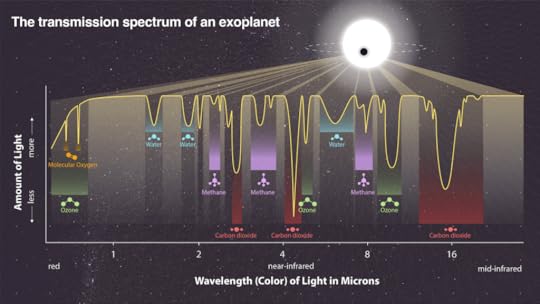
Recently, the James Webb Space Telescope detected dimethyl sulfide and dimethyl disulfide in the atmosphere of a gas giant orbiting a red dwarf star 124 light years from Earth, but what does this mean? How could this reveal the presence of alien life?
Dimethyl sulfide (CH3)2S gives us the smell of cooked cabbage, while dimethyl disulfide CH3SSCH3 smells like garlic. On the surface, we’re getting a hint of Masterchef: Red Dwarf Edition.

Seriously, though, these compounds have been detected with a three-sigma level of confidence in the measuring process. In a normal distribution (bell curve), 68% of values fall within ±1σ, 95% fall within ±2σ, and 99.7% fall within ±3σ, so the chances of this detection being a mistake is a mere 0.3%.

The question then becomes—what could produce these compounds? Could they be made by natural processes or are they the result of life?
Dimethyl sulfide has been found on comets, so it can be produced by processes other than life.
Here on Earth, dimethyl disulfide is produced by marine phytoplankton, so it’s a really good candidate for evidence of life.
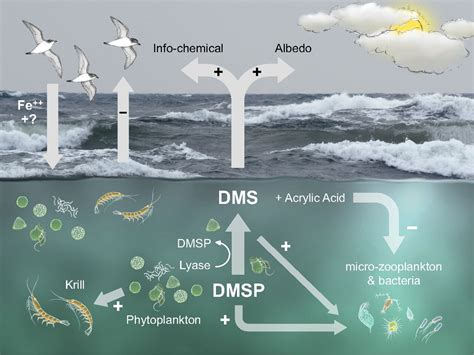
The question then becomes what other processes produce dimethyl sulfide and dimethyl disulfide in quantities similar to what we see on the planet K2-18 b in the constellation of Leo?
Prof Nikku Madhusudhan, an astrophysicist at the University of Cambridge, said, “I don’t think there is any known process that can explain this without biology.”
So… have we found life elsewhere in the universe? Maybe.
For now, the question shifts to looking for other natural mechanisms for producing these chemical compounds, but it may be that the natural mechanism is life itself.
The planet K2-18 b will be the focus of further studies as we seek to understand the origins of this unusual, unbalanced equation.



